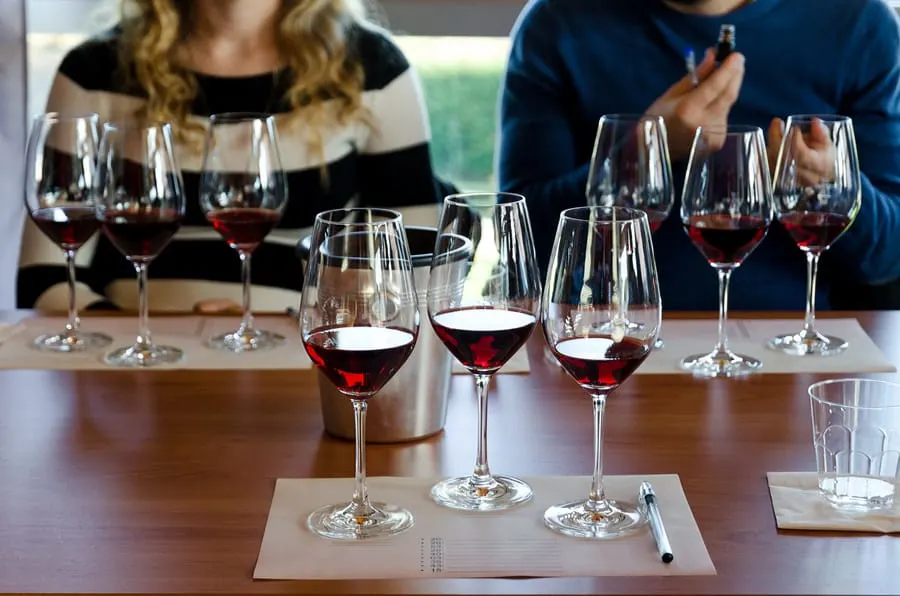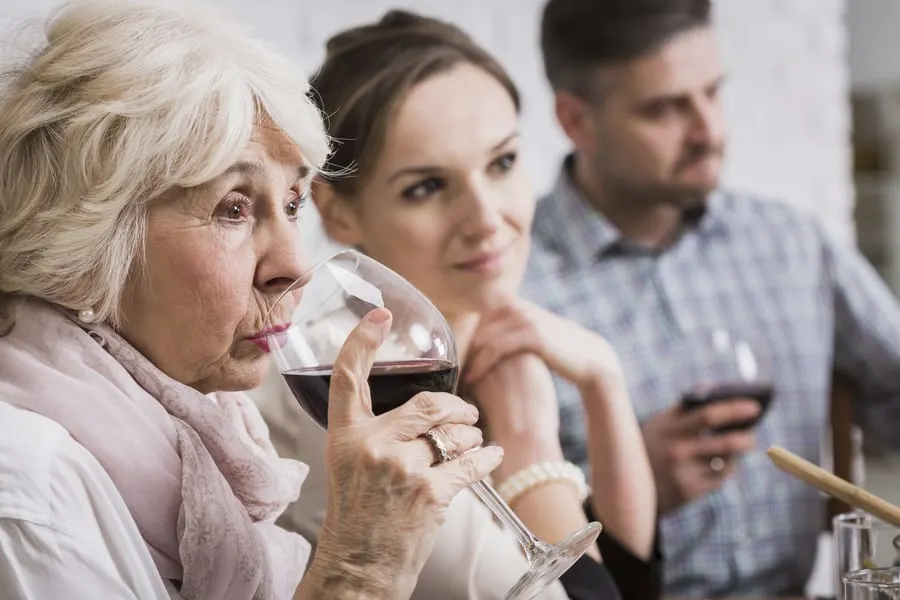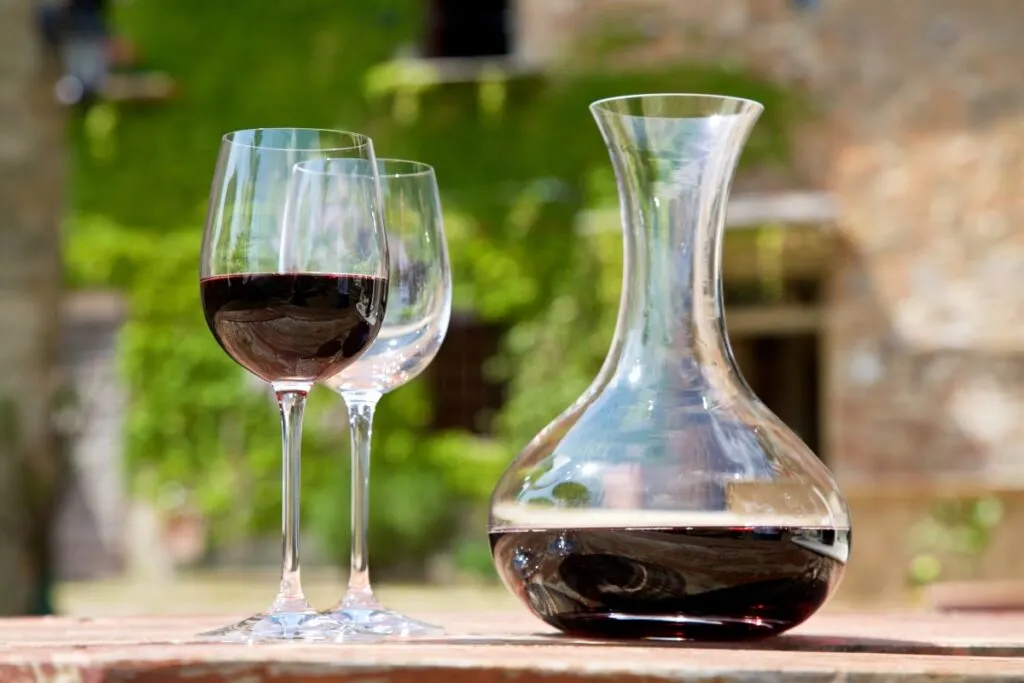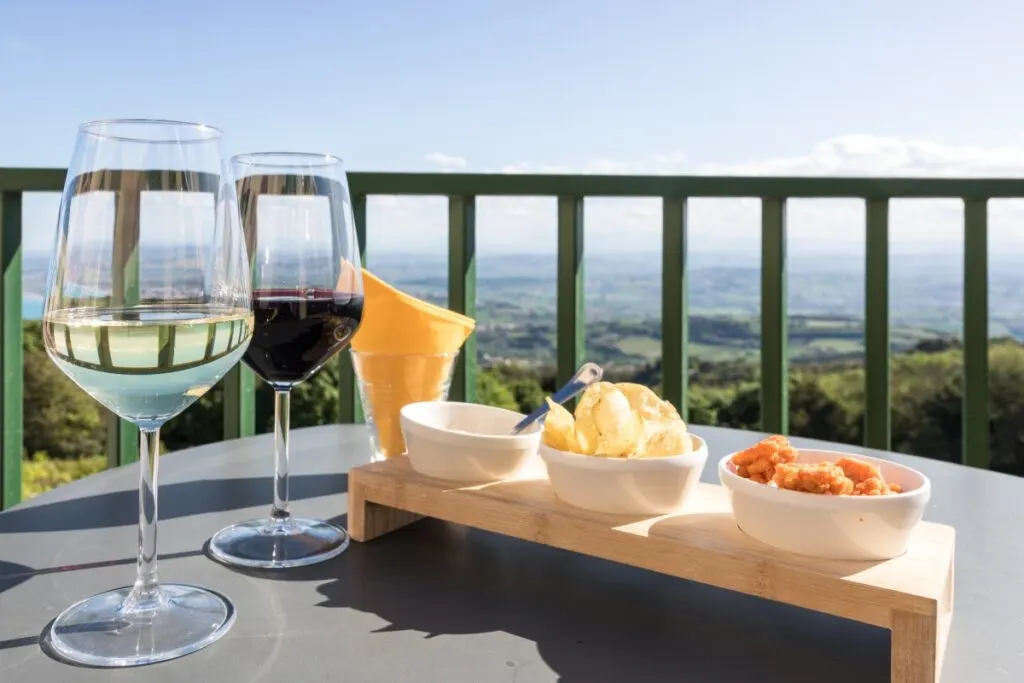As an Amazon Associate, I earn from qualifying purchases with no additional costs for you.
Good wine should never be wasted but many people wonder if they should spit out some of the wine they try at wine tastings. Even though it is a part of wine culture, countless new wine lovers are hesitant to spit out wine in the presence of others. I thought this was a topic worth a closer look to help give wine lovers the confidence to make their best choice.
Should you spit out wine at a tasting? This is a personal preference, but if you need to limit your alcohol absorption, drive after, or sample a lot of wine, you should consider spitting but most people prefer to sip responsibly at wine tastings. In winery tasting rooms, the intimate ambiance results in most people sipping their wine rather than spitting. At larger wine events, many more tasters will spit at least a portion of their wine to have the stamina for dozens of wine tastings and so they can keep their senses sharp for each follow-on wine.
In this article, I will provide valid reasons to sip wine and spit wine. Both are entirely up to the personal preference of the taster and the situation at hand.

TIP: If you want to check out the best refrigerator for wine storage, I recommend trying out the Avation (18 bottles) compressor refrigerator with Wi-fi smart app control cooling system. You can find this refrigerator by clicking here (Amazon link).
What to Do with Your Wine at Wine Tastings
Small Intimate Tastings
At winery tastings where the setting is more intimate, most people sip their wine rather than spit. Factors such as the number of wine samples tasted and a driver’s need to remain sober for safe driving could make spitting wine a more attractive option. Wineries are proud of their wine and prefer it savored rather than spit into a bucket.
You can find small family-run wineries in all 50 states and across the globe. Almost all of these wineries feature a beautiful tasting room in which seated tastings are offered along with a tour of the winemaking facilities and the vineyards.
Due to the limitations of geography and climate, each winery generally produces between three to five or so “flagship” wines, which will be poured for guests at the tasting.
Since vineyards are normally chosen for their ability to grow high-quality grapes for delicious wine, wineries and their tasting rooms are usually located a few hours away from major metropolitan areas.
This can make drivers more cautious about the amount they consume and whether they spit or not.
Recommendation box: Everything you need to enjoy your wine as much as possible. All recommended products are personally tested and regularly used by experts from this website (Amazon links):
> Ivation Wine Cooler – Energy-efficient wine cooler for 18 bottles with Wi-fi smart app control cooling system.
> Wine Rack – Beautiful, elegant wood rack for up to 7 bottles and the choice of vertical or horizontal storage.
> Durand Wine Opener – Classic vintage wine opener (we like all these classic staff).
> YouYah Iceberg Wine Decanter – The most beautiful and handy wine decanter we personally use.
> Bormioli Rocco Wine Glasses – A set of eight elegant and traditional wine glasses made in Italy.
> Vintorio Wine Aerator – Simple but really useful wine aerator for a reasonable price.
> The Original Vacu Vin Wine Saver – The best wine saver on the market in a package with two vacuum stoppers and two wine servers.
And if you want to become a true connoisseur of wine, we recommend reading the book Wine Folly: The Essential Guide to Wine (Amazon link), where you will find all the information you need about winemaking, wine varieties, flavors, and much more.
I received great insights from 2 wine industry professionals on this topic. There is no better source than those are run these great tasting rooms.
The first comes from Murray Cook at Dog Point Vineyard in Marlborough, New Zealand:
It is not up to me to recommend, as visitors may be driving themselves, or visiting multiple wineries that day. If they want to survive, then spitting is best. However, on driven tours, when guests are often on holiday, they usually enjoy sipping and not spitting. At the end of the day we make wine to drink and enjoy. I would say about 70% of tasters drink the wine and 30% end up spitting.
Additionally, I heard from Jenny Bradford who is the General Manager at Tennessee Valley Winery in Loudon, Tennessee:
We prefer our guests simply swallow their wine. Spitting can lead to the transmittal of germs that no one should deal with, especially in this day of coronavirus and super flus. In the nearly 8 years I have been apart of this winery, I can count on one hand the number of guests who spit their wine out. My best guesstimate would be 99.75% of people just consuming their wine at our tastings.
Winery tasting rooms are generally booked as private rooms for small groups. Winery tastings, and other small tastings like it, can be a great way to do a deep dive on one producer, and really focus on one style of wine.
Because there are fewer wines and more time to discuss each one, the guide is able to get very detailed in their explanation of certain topics, from vineyard practices to the history of the winery in the context of its larger region.
The more slowed-down focused pace of these small tastings means you will have more time to savor and enjoy the wine. If you have a designated driver or are part of a driven tour, go ahead and sip the wine. You can really enjoy it without concern of driving at afterward.
TIP: Which wines should you decant? This guide explains all you need to know. What is the best way to clean your wine decanter – can you use a dishwasher? Find out here!
Large “Event” Tastings

At large “event” wine tastings, most people are more comfortable spitting out their wine sips. There is somewhat of a street “fair” type environment and enough distractions for a casual spit of wine to go unnoticed by others.
Furthermore, an adventurous taster could sample hundreds of wines in an afternoon. If you are consuming all that wine, your absorption of the alcohol will be sky-high. Your ability to detect subtle notes within each wine will be impaired too.
I would recommend a mix of sipping and spitting wine if you want to enjoy a lot of different wines. If you only want to sample a few wines, then sipping them will be perfectly fine.
These events are normally organized by food and wine festivals, charity fundraisers, wine distributors, and importers. The organizers will invite dozens of wineries to attend; these events also feature caterers or restaurants to provide food, as well as the occasional brewery, cidery, or distillery to show off their beverages.
TIP: A suitable wine glass is the basis for enjoying well-being while drinking your favorite wine variety. Here are our favorite ones (Amazon link):
- Bormioli Rocco Crystal Wine Glasses: A set of eight elegant and traditional wine glasses made in Italy for a reasonable price.
- Riedel VINUM Wine Glasses: Luxury set of two wine glasses suitable for any occasion. We just love them!
- Schott Zwiesel Tritan Crystal Glasses: If you like unusual alternatives, a set of six stemless glasses made of crystal glass.
Each producer is given a station to welcome guests and present their wines; attendees are invited to mingle with one another and wander from table to table to sample any wine or range of wines that piques their interest.
Like winery guides, the people manning the tables at these events are quite knowledgeable about the wines being poured.
TIP: Should you tip your Sommelier at a wine tasting? This guide provides all the dos and don’ts. Do you know the difference between expensive and cheap wines? Ask the Sommelier or this article to find out!
Due to the setup and format of the event, there can be north of a thousand people at a tasting. The experience, unlike the tour and tasting of a single winery, is largely self-guided; due to the sheer size of the crowd, these events can get quite loud and chaotic.
They are a great casual way to enjoy wine but won’t deliver the breadth of experience a winery’s tasting will.
The Case for Sipping vs. Spitting Wine
The Argument for Sipping Wine
Sipping wine at a wine tasting seems like the natural, intuitive thing to do. For wine lovers, it feels downright immoral to waste good wine.
And spitting just seems so uncouth. Nobody wants to be caught with wine spit dribbling down their chin, or worse, be on the receiving end of the dreaded spit-bucket splashback.
At most tastings when nobody else seems to be spitting, and it ultimately feels much more elegant to simply drink the wine. If you’ve paid for entry to the event, you might feel motivated to “get your money’s worth.”
When paying for a private tasting, pouring away wine can feel wasteful. And indeed, if you’re taking a day trip out to a winery an hour away, sipping on a few glasses of wine with your friends and then stopping by a restaurant for dinner is a perfect day and a completely reasonable thing to do.
If there aren’t too many wines to try, and you’re not working or driving, sipping the wine is perfectly fine to do. Ultimately, the purpose of a wine tasting is to try the wines and to purchase the ones you enjoyed, to have later in the comfort of your home, in a restaurant, or with friends.
TIP: Do you know how much alcohol is in your favorite wine? Read this article for all the facts. What happens if you don’t like the wine you ordered? Is there a certain etiquette involved in returning it, or is that simply bad manners? Find out the correct etiquette here.
Drinking the wine at the tasting most closely replicates that experience, and might give you the most accurate idea of which wines you’d like to take home with you.
The Argument for Spitting Wine

There are a few reasons that someone might choose to spit wine. There are technical advantages to spitting wine. Spitting encourages the taster to coat more of their mouth with the wine, allowing the taste receptors and nerves all over the mouth (not just the tongue) to experience the wine.
In the act of forceful spitting, the aromatic particles in the wine are aerated a little further in the retronasal cavity, the space connecting the nasal passageway to the palate. This extra bit of aeration provides more sensory information about wine than sipping the wine might give.
TIP: If you are interested in buying a wine decanter, I recommend purchasing these two top-quality decanters:
- USBOQO Wine Decanter (check it out on Amazon & read customer reviews)
- Iceberg Wine Decanter (check it out on Amazon & read customer reviews)
For a beverage that often comes to life with extra oxygenation, slurping and spitting the wine is just the last extra bit of air that a pro might need to thoroughly evaluate a wine. The most obvious reason is, of course, to avoid excessive intoxication.
Becoming drunk in public is never cool and neither is driving under the influence. But its intoxication from wine goes beyond that. It might be counterintuitive, but too much drinking prevents you from being able to taste the wine effectively on a couple of levels.
TIP: Is there a time limit for keeping wine in a decanter? Read this article to find out. How many glasses of wine does a carafe hold? This guide explains how many glasses, according to size.
One is simply the practical consideration that being intoxicated makes it difficult to remember which wines you enjoyed and which you didn’t, which after all is the entire purpose of a wine tasting.
If you get too drunk too soon, you might not end up tasting all the wines offered, especially at a large tasting with hundreds of wines. The other main reason for spitting is that being too drunk physiologically prevents you from being able to discern flavors in the wine.
Alcohol is a depressant drug, which depresses nerve cells and impairs the communication between cell to cells, including the overall function of the brain.
Our senses of flavor and smell aren’t exempt; after one too many glasses, one flavor profile bleeds into the next, and an entire flight of wines will taste more or less the same.
Factors for Consideration

People in the wine industry are learning to navigate a pandemic that seems it’s here to stay. As we do so, we must also consider heightened sanitary practices moving forward.
Although the risk of actually contracting infections from spit buckets is pretty low even in normal times, illnesses that are spread through saliva include colds and flu, and as much as we try to protect tasting event workers with protective gear and sanitizer, accidents — gross ones — happen.
Further, as we reel from a pandemic spread through airborne droplets, it’s important to reconsider all of our practices as a consumer-focused industry.
There are wine conventions and tastings that have already made it a practice to give guests their own spit cup, and some producers are holding tastings by pre-pouring their samples into smaller containers. These are all practices we should consider as we imagine a post-pandemic world.
Although learning to spit and pour away wine is a useful tool for the consumer and an indispensable one for the professional, there is a time and a place for simply sitting back and enjoying the wine.
One practice isn’t necessarily better than the other; they are simply two different ways to enjoy wine. Spitting is just a great tactic to extend your stamina at a tasting event and to watch out for your health and safety at the same time.
I believe Murray Cook with Dog Point Vineyard summarizes this article best:
Wine is about relaxation and enjoyment in a social setting. Drinking is a part of this. Spitting is important if many wines are required to tasted and given focus and attention. But overall, we go to great lengths to produce wines for people to enjoy and not be spit down the drain.
Special Thanks
I want to give a very special thanks to Murray Cook with Dog Point Vineyard in Marlborough, New Zealand, and Jenny Bradford with Tennessee Valley Winery in Loudon, Tennessee for their contribution to this article.
If you are ever in New Zealand or Tennessee respectively, please stop by for a wine tasting. Additionally, you can purchase Dog Point Vineyard online if you can’t make the trip. Both of these great establishments deserve your visit.
TIP: Check out this page for a complete list of wine products and accessories I love. You’ll find my recommendations for wine refrigerators, decanters, and aerators and the best place to buy wine online. Click here to see the complete listing.
